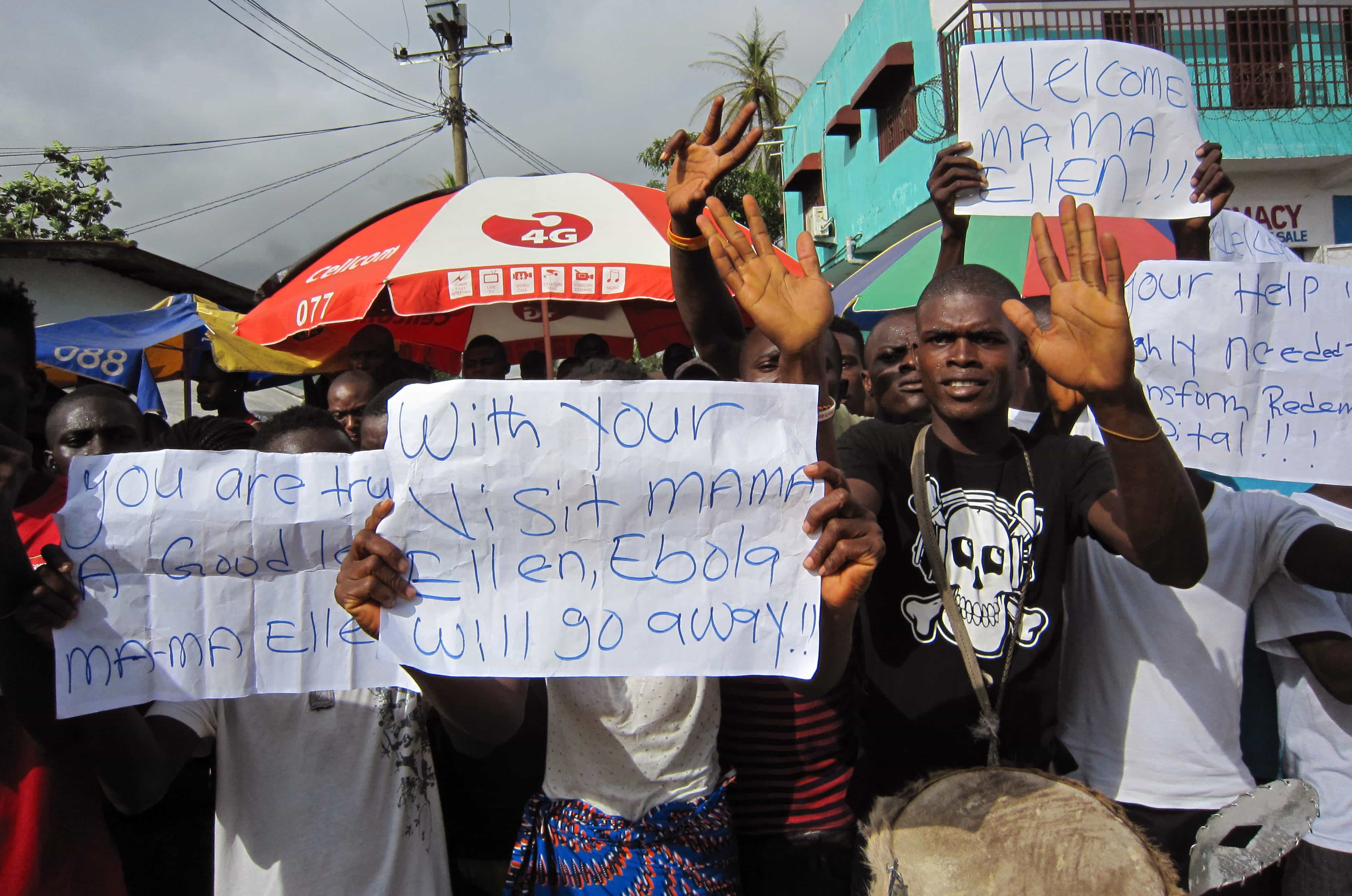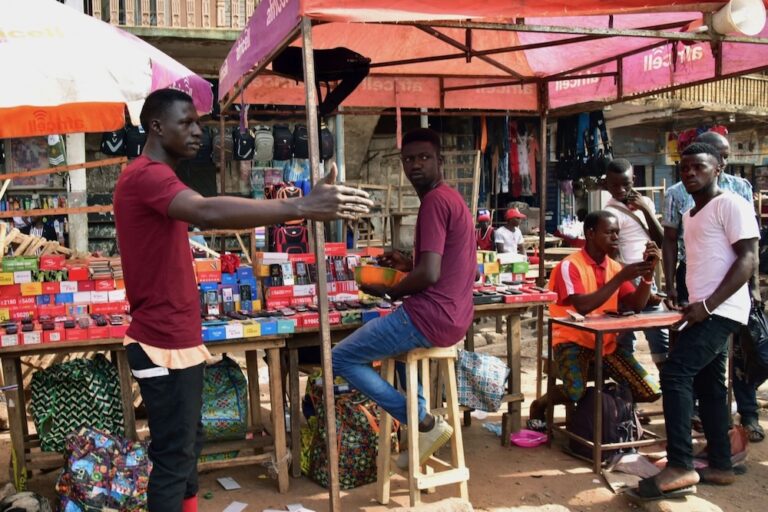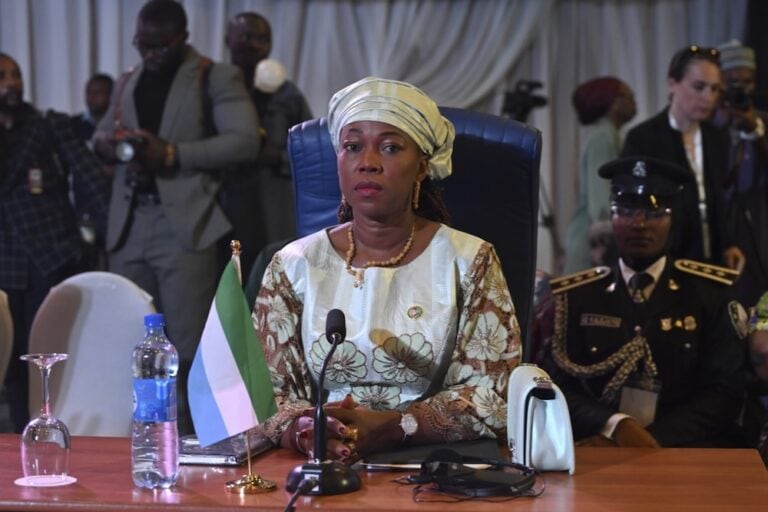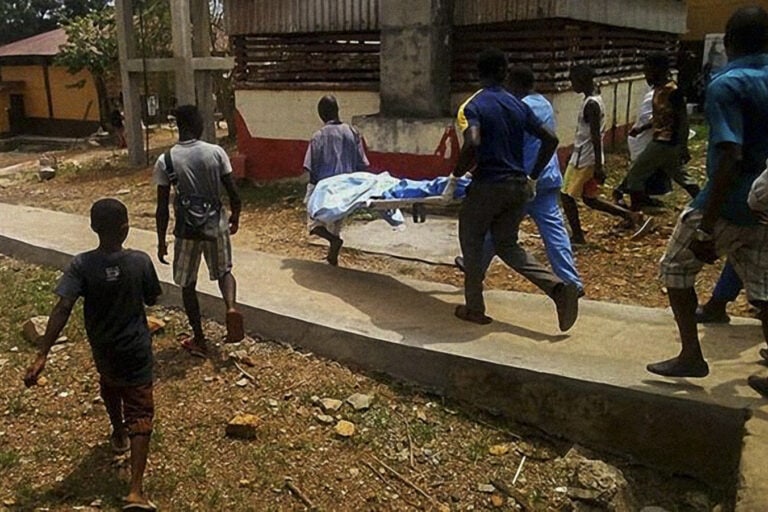Media crackdowns in Liberia and Sierra Leone may be cutting off access to potentially life-saving information about Ebola.
A few months ago, a hospital in Sierra Leone became the site of a dramatic consequence of misinformation.
On 25 July 2014, a mob of angry people attempted to break into the Ebola Treatment Centre in the city of Kenema after hearing a rumour that the Ebola virus – a severe, often fatal disease with no known cure – was invented to provide a cover for “cannibalistic rituals,” according to Reuters. Protestors threatened to burn down the building and remove its patients. Police responded by firing tear gas at the crowd, and shooting a 9-year-old boy in the leg.
Now, police and soldiers are patrolling areas worst hit by the virus in Sierra Leone, and its neighbouring country, Liberia. Security forces in Sierra Leone were deployed in August “to establish a complete blockade” of Kenema and Kailahun districts, where they set up 16 checkpoints on major roads, according to Reuters. In Liberia, residents of Monrovia’s West Point slum had their neighbourhood barricaded in barbwire, and are having difficulty obtaining food, reports the BBC.
But while misinformation can clearly be dangerous, keeping the population “safe” seems to be occurring at the expense of access to information in both countries – at a time it is a key factor in the fight against the spread of the disease.
On 6 August 2014, Liberian President Ellen Johnson Sirleaf declared a 90-day state of emergency in the country, noting that the government will “institute extraordinary measures, including, if need be, the suspension of certain rights and privileges.”
The Center for Media Studies and Peacebuilding-Liberia (CEMESP) is concerned that some of the aforementioned “rights and privileges” include the ability to report. In August, FrontPage Africa journalist Henry Karmo was beaten and arrested by police officers in front of the Ministry of Foreign Affairs. Karmo had been photographing people who were protesting the state of emergency, when the police impounded his camera and detained him, even after Karmo had shown his media credentials.
Less than a month later, Liberian police ordered Karmo’s media outlet, FrontPage Africa, to turn off its generator, because it was allegedly causing pollution. Reporters Without Borders notes that other nearby companies were permitted to continue using their generators. Without the use of theirs, FrontPage Africa was unable to produce and print their newspaper.
At around the same time, investigators for the Liberia National Police (LNP) harassed publisher Helen Nah, after her media outlet, Women Voices newspaper, published a story about the alleged misappropriation of money intended for the Ebola Response Fund.
The board of Women Voices has condemned the Liberia National Police’s response to the article, saying it is undermining the media’s efforts to contribute to the fight against the Ebola epidemic, according to CEMESP.
Preventing a media outlet from reporting in Liberia and Sierra Leone has a broader impact than on the public’s right to know about corruption allegations. As Human Rights Watch notes, local newspapers and community radio play “a key role in public health education.”
The organization provides the example of Radio MOA – a community radio station in Sierra Leone’s Kailahun district – that transmits interviews with health experts, officials, and Ebola survivors daily on their “Watin Di Bi Nah Yu Community” (“What is Happening in Your Community?”) radio program. The show reaches tens of thousands of residents from Sierra Leone, Liberia and Guinea.
Shows like these have the capacity to address aspects about the spread of Ebola that may not be addressed through government announcements.
For example: the gender dimension. According to Human Rights Watch, Guinea’s Health Ministry stated that as of 7 September 2014, women made up 54 percent of Ebola cases. In Liberia, the Ministries of Health and of Gender and Development reported that 75 percent of those infected or who have died from Ebola are women. Taking care of the ill, washing and preparing bodies for burials are activities traditionally done by women in the countries most affected by Ebola, and appear to put women at greater risk of contracting the disease, notes Human Rights Watch.
Some individuals have not waited for radio shows or news outlets to discuss Ebola symptoms or prevention methods – they’ve taken the matter into their own hands. The Associated Press reports that Liberian rappers Shadow and D-12 have released several Ebola-related tunes. Their hit song, “Ebola in Town,” is intended to challenge scepticism about the virus. Similarly, in Sierra Leone, a song and music video called “Ebola Does Not Discriminate,” by rapper Special C, conveys the dangers of hiding sick patients.
Given that news and music have the capacity to reach so many individuals across Sierra Leone and Liberia, it suggests that governments should use the media’s influence to their advantage, as a means of disseminating potentially life-saving information about Ebola.
With access to information increasingly constrained in West Africa – particularly in Liberia – several IFEX members are calling on the authorities to respect freedom of expression as their governments continue to combat Ebola.
In a blog post for the Committee to Protect Journalists (CPJ), Peter Nkanga writes, “As Liberia struggles to contain the health crisis, the government should show tolerance, and partner with the media to encourage the flow of information and debate.”
In a statement e-mailed to IFEX, the West African Journalists Association notes that the Liberian government “…cannot afford to demobilize any segment of the society in fighting the disease and should not therefore use the state of emergency as an alibi to aggravate an already worsening crisis.”
As of 16 September 2014, the World Health Organization has documented a total of 4963 cases in Guinea, Sierra Leone and Liberia, with 2453 of those cases resulting in death.



